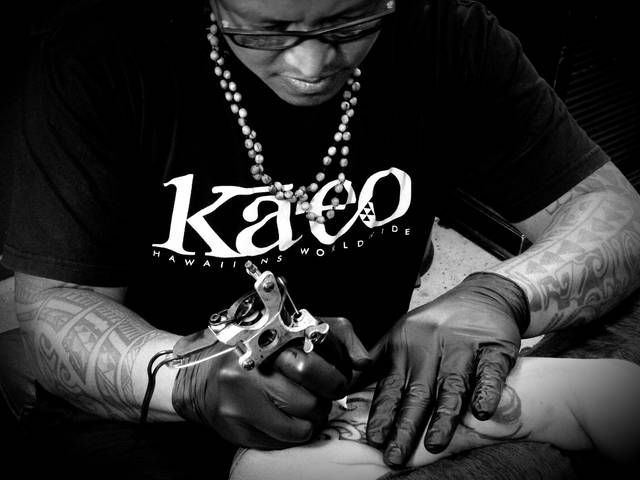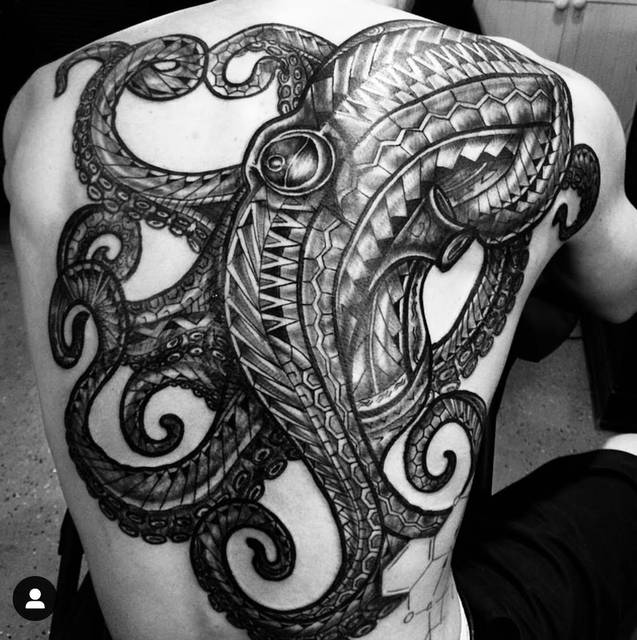Che Pilago has been tattooing since he was a teenager. Around age 15, he started sneaking his dad’s tattoo equipment to work on friends when his parents were out camping for the weekend (don’t tell them). Che grew up watching his dad, Angel Pilago, and close relatives tattoo. His dad’s side of the family comes from a long line of tattoo artists who specialize in traditional Polynesian-style tattoo, or tatau.
Self-employed as a tattoo artist since 2004, Che opened his tattoo shop in Kona, Ka’eo Hawaii, in 2014. People from different backgrounds travel from around the world and around the corner to sit in his chair. His skill and unique approach have gained him notoriety beyond the Hawaiian islands. He is the recipient of numerous awards, including the International Polynesian Tattoo Award in 2014 for his backpiece of a giant hee, or squid. The piece was inspired by his client’s love of diving.
Che is known for his freehand tattoo style. He does not use computer-generated outlines and prefers to sketch out the general shape by hand on his clients, and then let the tattoo unfold like a work of art. The pieces he creates are so detailed and symmetrical that this fact is hard to believe until you see him in action. Mirroring the natural shape and curve of the body, his finished pieces appear as a natural extension of the wearer — because they are.
Traditionally used to represent the wearer’s ancestral lineage and social status, Polynesian-style tattoos have depth, telling a story with many layers. Che’s work is a practice in blending this tradition with contemporary art. Essentially, as a tattoo artist, he is a storyteller. He takes people’s insides — their heart, soul and life journey — and creates a beautiful representation of that on their bodies.
“What I love about tattooing is feeling people’s energy and creating something that is uniquely theirs — a reflection of their identity. It’s like armor. The tattoo gives the wearer a sense of pride, confidence, and protection,” Che said.
His tattoos incorporate traditional shapes and symbols that have significance in Hawaiian culture like the hapuu fern, which represents growth on all levels — mental, physical and spiritual. Tattooing someone means getting close with them. Many clients open up about things they wouldn’t normally share. As in many people’s stories, there is light and darkness. His clients talk about struggles with depression, suicide, and addiction, relationships ending or beginning. They come to him going through major life transitions. They talk about their passions in life — the things that keep their soul awake. They speak about their cultural background, ancestry and children.
Che’s own tattoos depict his family’s history as sailors and martial artists descendant from Kekuhaupio, a Hawaiian martial arts master who trained King Kamehameha I. He has tattoos of his children — his daughter Mehana Okalaa, meaning “the warmth of the sun,” and his son Aukai, meaning “waterman,” are depicted by symbols that reflect their names. Che is teaching his son Aukai to tattoo.
Ka’eo, the name of Che’s shop translates to “old soul, full of knowledge.” Broken down it means “the (ka) call (eo). It’s a call to Hawaiians worldwide to achieve their goals and live their culture. Taking it a step further, the call goes out to people of all backgrounds who practice the Hawaiian values of living pono and with aloha. That is what Che Pilago is trying to share through the art of tattoo.
To see more of Che’s work, follow him on Instagram @chepilago and on Facebook @kaeohawaii. Visit his shop at 75-143 Hualalai Road in Kailua-Kona, or call 498-4211 for an appointment.
Emily Gleason is a member of Business Network International (BNI) Kona Connections Chapter in Kailua-Kona and helps business owners reach their dream clients at www.mthewriter.com. She contributes a monthly business feature to West Hawaii Today.





